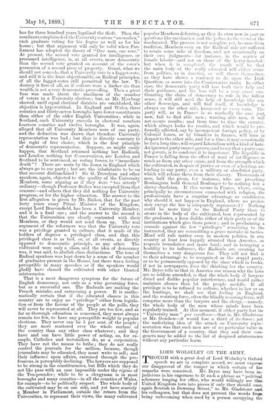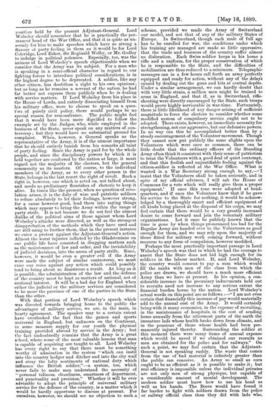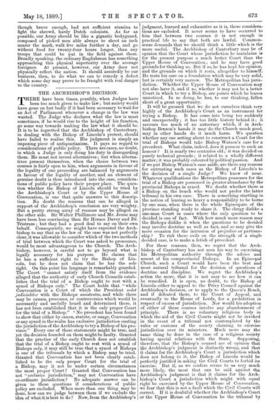LORD WOLSELEY ON THE ARMY.
THOUGH with a great deal of Lord Wolseley's Oxford X speech we are in complete accord, we must express our disapproval of the temper in which certain of his remarks were conceived. Mr. Bryce may have been in- judicious in his eagerness to fit such a phrase as " political. schemers longing for office, who would willingly see this. United Kingdom torn into pieces if only they should onee, again flourish in Downing Street," to Mr. Gladstone aaldi his colleagues, but that does not prevent the words frost being unbecoming when used by a person occupying the position held by the present Adjutant-General. Lord Wolseley should remember that he is practically the per- manent head of the War Office, and that it is quite as un- seemly for him to make speeches which have so strong a flavour of party feeling in them as it would be for Lord Coleridge, Lord Esher, Sir Reginald Welby, or Mr. Godley to indulge in political polemics. Especially, too, was the animus of Lord Wolseley's speech objectionable when we consider that the Army was its subject. For a man who is speaking in a semi-official character in regard to our fighting forces to introduce political considerations, is in the highest degree to be deprecated. A soldier, like any other citizen, has doubtless a right to his own opinions ; but as long as he remains a servant of the nation, he had far better not express them publicly when he is dealing with service matters. If Lord Wolseley from his place in the House of Lords, and entirely dissociating himself from his military office, were to choose to speak on a ques- t' on of purely civil policy, there would perhaps be no special reason for remonstrance. The public might feel that it would have been more dignified to follow the example set by the Judges, who, while employed in the business of the State, never speak on any matters of con- troversy; but they would have no substantial ground for complaint. When, however, a General speaks as the representative of the Army, it is of the utmost importance that he should entirely banish from his remarks all taint of party feeling. Since the Army is paid for by the whole people, and since the disciplinary powers by which it is held together are conferred by the nation at large, it must regard not the majority of the electors, but the general community as its masters. Of course, to the individual members of the Army, as to every other person in the State, belongs in the last resort the right of revolt. Such a right is, however, one which is acted on, not talked about, and needs no preliminary flourishes of rhetoric to keep it alive. In times like the present, when no question of revo- lution arises, it is the duty of wise and patriotic soldiers to refuse absolutely to let their feelings, however strong, for a cause however good, lead them into saying things which may appear to bring the Army within the range of party strife. It is not because we do not feel the utmost dislike of the political aims of those against whom Lord Wolseley's attacks were directed, as well as the strongest disapprobation of the methods which they have used and are still using to further them, that in the present instance we enter a protest against the Adjutant-General's action. Almost the worst injuries inflicted by the Gladstonians on our public life have consisted in dragging matters such as the maintenance of law and order, and the inviolability of judicial decisions, into the arena of party strife. Since, however, it would be even a greater evil if the Army were made the subject of similar controversy, we must raise our voice against any action which could possibly tend to brine about so disastrous a result. As long as it is possible, the administration of the law and the defence of the country must be kept as matters of national, not of .sectional interest. It will be a bad day for England when .either the judicial or the military services are considered to be more the province of one of the parties in the State than the other.
With that portion of Lord Wolseley's speech which was directed towards bringing home to the public the advantages of military service, we axe, in the main, in hearty agreement. The speaker may to a certain extent have overlooked the fact that the games and sports universal in England, but unknown on the Continent, in some measure supply for our youth the physical training provided abroad by service in the Army ; but the fact undoubtedly remains that the Army is a great school, where some of the most valuable lessons that man is capable of acquiring are taught to all. Lord Wolseley has every right to say that there must be something worthy of admiration in the system "which can instil into the country hedger and ditcher and into the city waif and stray the lofty sentiments of national duty which influence the British soldier,"—a system, too, which never fails to make men understand the necessity of "personal tidiness, cleanliness, smartness of deportment, and punctuality and precision." Whether it will be ever advisable to adopt the principle of universal military service for the defence of the country, is a matter which it would be hardly opportune to discuss at present. For ourselves, however, we should see no objection to such a scheme, provided we made the Army of Switzerland our model, and not that of any of the military States of Europe. In Switzerland, though each male of full age has to be enrolled for war, the conditions under which his training are managed are made so little oppressive, that the trade and business of the country suffer almost no dislocation. Each Swiss soldier keeps in his home a rifle and a uniform, for the proper conservation of which he is responsible to the State, and the difficulties of mobilisation are thus reduced to a minimum. Telegraphic messages can in a few hours call forth an army perfectly equipped and ready for action, without any of the delays caused by dealing out the guns and kits at central depots. Under a similar arrangement, we can hardly doubt that with very little strain, a million men might be trained to arms in England, and that if, as in Switzerland, rifle- shooting were directly encouraged by the State, such troops would prove highly serviceable in war-time. Fortunately, there is little likelihood of any danger arising of sufficient magnitude to force the electors to consider whether some modified system of compulsory service ought not to be adopted. There exists, however, an immediate necessity for strengthening, not our aggressive, but our defensive powers. In no way can this be accomplished better than by a steady encouragement of the Volunteer movement. Though - they cannot now put publicly the same slights upon the Volunteers which were once so common, there can be little doubt that the ordinary officers of the Standing Army often think it consistent with their sense of patriotism to treat the Volunteers with a good deal of quiet contempt, and that this foolish and unjustifiable feeling against the citizen-soldier is reflected at the War Office. What is wanted is a War Secretary strong enough to say,—' I insist that the Volunteers shall be taken seriously, and in spite of my official advisers, I will ask the House of Commons for a vote which will really give them a proper equipment.' If once this tone were adopted at head- quarters, and if once the Volunteer knew that if he gave his service to the State for nothing, it would be acknow- ledged by a thoroughly smart and efficient equipment of all kinds being placed at the disposal of his corps, we may feel certain that there would be a very greatly increased desire to come forward and join the voluntary military organisations. Let it once be publicly known that the time is gone by when things pronounced too bad for the Regular Army are handed over to the Volunteers as good enough for them, and we may rely upon the majority of those fitted for military work coming forward, without recourse to any form of compulsion, however modified.
Perhaps the most practically important passage in Lord Wolseley's speech was that in which he had the courage to assert that the State does not bid high enough for its soldiers in the labour market. If, said Lord Wolseley, the country would consent to pay a sum which would fill the ranks with men of the class from which the police are drawn, we should have a much more efficient Army than we have at present. In his opinion, a con- siderable increase in the pecuniary inducements held out to recruits need not increase to any serious extent the financial burden borne by the nation. Lord Wolseley's actual words on this point are as follows :—" I am not even certain that financially this increase of pay would materially add to the annual cost of the Army. It would certainly bring with it many economies, in the expense of recruiting, in the maintenance of hospitals, in the cost of sending home annually from the uttermost parts of the earth the immature lads whose health broke down from climate, and in the pensions of those whose health had been per- manently injured thereby. Surrounding the soldier at this moment there were many items of annual expense which would be saved if we obtained our recruits as men are obtained for the police and for railways." On such a point, we may feel certain that the Adjutant- General is not speaking rashly. The waste that comes from the use of bad material is infinitely greater than the public can conceive. An Army so small as ours ought to be as efficient as it is possible to make it; but real efficiency is impossible unless the individual privates are not only men of strong physique, but capable of a considerable amount of mental development. The modern soldier must know how to use his head as well as his hands. The Boers would have found it far harder to fight with soldiers drawn from the police or railway official class than they did with lads who, though brave enough, had not sufficient stamina to fight the shrewd, hardy Dutch colonists. As far as possible, our Army should be like a gigantic bodyguard, composed of picked men able always to shoot an inch nearer the mark, walk five miles further a day, and go without food for twenty-four hours longer, than any troops that could be put in the field against them. Broadly speaking, the ordinary Englishman has something approaching this physical superiority over the average foreigner. At present, however, our Army does not physically reflect the nation. It should assuredly be our business, then, to do what we can to remedy a defect which some day may prove to be fraught with real danger to the country.




































 Previous page
Previous page